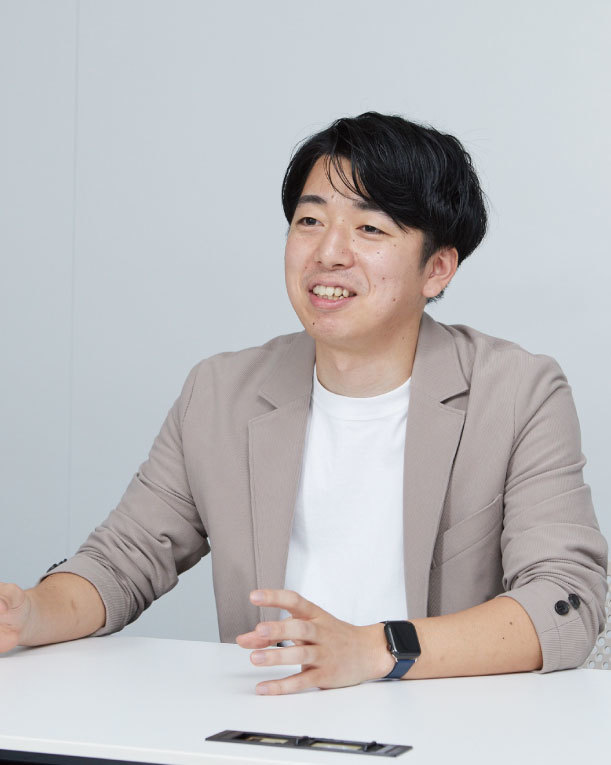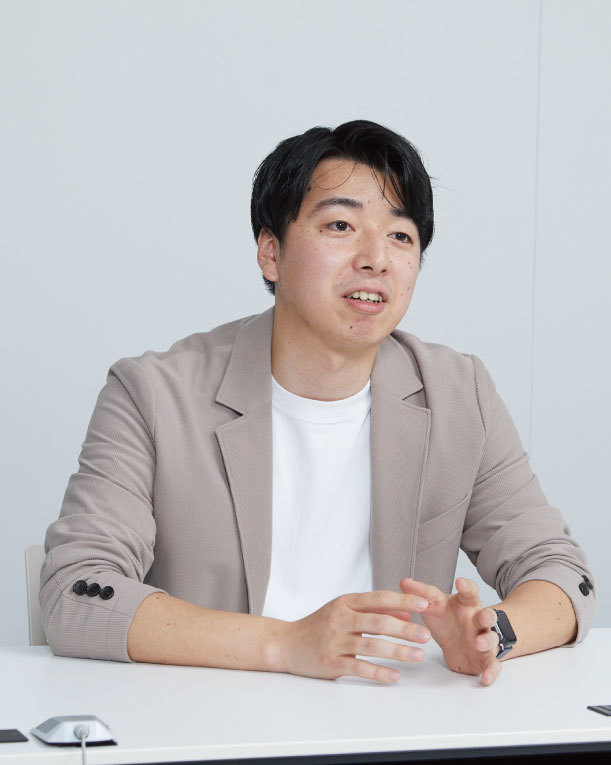STORY
Employee Development
Pushing the boundaries of his own potential with the ability for flexible response and accurate judgment of customer needs acquired in San Jose, U.S.
August 19,2022
In his fourth year after entering the company, when he was 27 years old, Ryohei Kawasaki participated in the overseas sales company training*1 and went over to San Jose, America. Although he had been in charge of the development of consumer camera image sensors in the Imaging System Business Division in Japan, in San Jose he was responsible for providing technical support related to image sensors in various types of applications including security cameras. His experiences in listening to many different types of opinions from customers directly, and his sense of duty at being on the front lines of business himself, honed his flexible response capabilities and skills for accurate judgment to identify customer needs, broadening his viewpoint toward business. He also says that this opportunity made him aware of the necessity for Sony Semiconductor Solutions Corporation (SSS) to advance itself to the position of a “platformer” as a means of expanding the scale of its business in the future like the IT giants in America. Through this interview, we gained an idea of what will be essential for business in the global society from here on as it continues to expand even further.
*1) “Overseas sales company training” is a human resource development initiative that is unique to SSS. The goal is for employees to work on the front line with overseas customers to expand the breadth of their experience, to gain an understanding of the market trends and situation of technology utilization overseas, and to obtain human connections in the local area.
Kawasaki Ryohei
Sony Semiconductor Solutions Corporation
System Solution Business Division
Joined SSS in 2016. Affiliated with the Imaging System Business Division. Experience in the roles of circuit design engineer for consumer camera image sensors, and development project leader. In 2022, transferred to the System Solutions Business Division. Involved in collaborations with AI development partners and examining roadmaps for the development of future image sensors.
Taking on the challenge of overseas-assigned training, from a desire to hear opinions directly from customers
Kawasaki recalls that he was able to take the bold step toward overseas-assigned training because “I thought that if it was just for one year, I could make it through somehow.” It was his fourth year after entering the company, and his superior had suggested going on an overseas assignment in a different region, but since such assignments were normally for a term of three years he was somewhat hesitant to do so. Kawasaki, who had never considered overseas assignment as part of his own career, was apprehensive about suddenly going to an unfamiliar place. However, he also had the desire to do work while listening to more opinions directly from customers. Since he worked at the time as a circuit design engineer, he rarely had opportunities to hear the opinions of customers directly and at times wondered about the needs of customers, questioning whether what he was creating was what they actually wanted. That is because, while he was a university student, he had participated in joint industry-academic research with corporate representatives, in which the university side created prototypes and the corporate side provided feedback directly to the university side, so he had been in an environment where he could directly hear customer voices. This experience allowed him to have a viewpoint that is simple and essential for a developer, “Who am I developing this for?” Just as he was feeling uneasy about a three-year overseas assignment while still wanting to do work closer to customers, he found out about the one-year overseas sales company training program through internal e-mail, and realized that this was his chance.
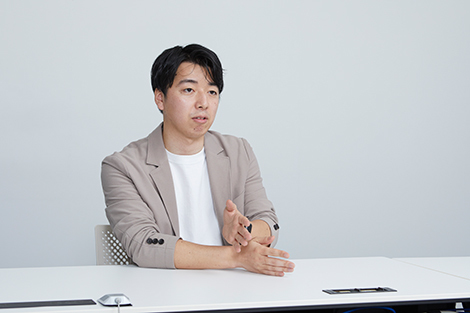
Kawasaki’s assignment location was the city of San Jose in the state of California in America, and the work he was responsible for was customer technical support. What he noticed first of all in his new assignment were the differences in the sense of speed of the local staff compared to that of staff in Japan, and the ways of approaching work. Since the number of employees was small, every staff member had the mindset of responding to customers themselves, and they performed their work while taking pride in representing SSS. This meant it was only natural for all individuals to be self-reliant and act on their own initiative. By coordinating a general framework with supervisors in advance, they were able to exercise a certain amount of discretion on their own and proceed with business discussions quickly. “In Japan, I don’t think a delay of one or two hours would make us fall behind that much, but if we need to ask for technical support from Japan while in America, it is possible that an answer might not be able to be received during the same day because of time differences. That was why inquiries to Japan were given the highest priority when supporting customers,” notes Kawasaki. He says he was very careful because “A delay in responding to customers might cause business discussions to fail and impact our sales performance.”
Being highly sensitive and alert to what customers require
At the start of his assignment, he was involved with responding to customers by accompanying sales representatives and other technical support members. Some of his customers did not have thorough knowledge of image sensors, so he had to break down technical explanations to make them easier for anyone to understand, and then communicate them in English. Also, since he had no idea about specific key points for responding to customer requests, he struggled at getting used to how to listen and speak to customers during business discussions. It is something we hear about often, but it is true that good communication with people in English-speaking countries cannot be achieved by the vagueness of expressions unique to the Japanese language. Kawasaki gained first-hand experience in the importance of clearly communicating what could and could not be done. As he became accustomed to work, he also gained more opportunities to visit and support customers by himself regarding technical matters. Because of the heavy responsibility when responding on his own, he tried predicting what customer requests would be before discussions, but his predictions often missed the mark. At one time, when he visited a customer about a matter that he did not think was particularly serious from the content of e-mails, the customer had gathered around 15 people including remote members to discuss it. In the end the discussion was concluded successfully, but it made him reflect on many points including icebreakers to encourage interaction, and how to facilitate discussions. Regarding how to respond in a situation like this without panicking, “It is possible to get used to it to a certain extent by meeting many different customers face-to-face. What is additionally important is to thoroughly research the customer’s business field, and be prepared to talk about the industry trends and the customer’s issues at any time. And also, to proceed with discussions while being highly sensitive and alert to what the customer wants.” He further explains that the ability to find out important information through various conversations, and not just simply listen to requests, is essential. By being prepared with information about the industry, it will be possible to hold discussions with confidence.
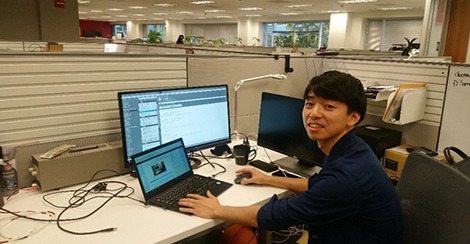
Business scene in San Jose, America
Kawasaki remembers that during the time he was still not used to communicating in English, he was saved by the power of the Sony brand. “When I participated in exhibitions or academic meetings, once people found out I was a developer from Sony they all started asking me questions. Since they already had the stance of asking questions to me, I was able to communicate even with my poor English.” The team he was in included many Japanese people, so communication within the team was not particularly difficult, and he strengthened his relationships with his team members while talking with them at lunch or being invited to home parties on weekends. Although it may sound like everything went smoothly, Kawasaki actually encountered difficulties in a matter other than his workplace environment and his language ability - namely, how to spend his days off. Even though he was busy at the local site, his working hours there were shorter than in Japan, so as he became used to work he also became troubled about how to spend his time after work and on days off. This encouraged him to join a local basketball community. He thought that with basketball, which was an interest of his since his time in junior high school, he could communicate more smoothly than he could just through English. This experience not only allowed him to enrich his time off from work, but by entering an environment completely different from his workplace, he was able to experience the local culture and hear their ideas, which helped in breaking down the psychological obstacles regarding language and the country that he had been facing.
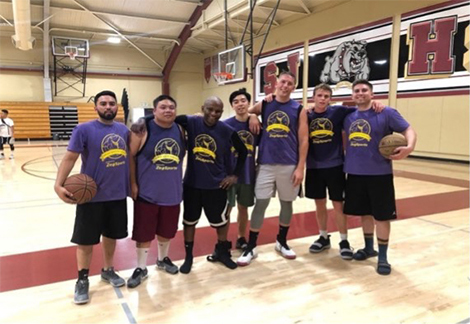
Spending his private time with friends from a local basketball team
Experiencing the expansion of the image sensor business first-hand,
and searching for a direction for SSS to grow in
During his assignment, Kawasaki stayed alert to businesses and trends in America, and gathered extensive information from SSS’s employees on business trips at the same time. His experiences in responding to various customers using this information as a weapon presented an opportunity to think about the trends occurring in the world as well as the direction to take to expand the scale of the SSS’s image sensor business. As traveling across America and promoting business with a wide range of companies including IT giants, Kawasaki began to recognize the tremendous future potential of the image sensor business. On the other hand, he also acutely felt the significance of the impacts the platform strategies of IT giants have on business. This is because business conducted on platforms is greatly affected by the platformers, so it is not possible to increase the scale of business to more than that of the platformers. Before his overseas assignment, he had been responsible for consumer camera image sensor development, and had thought about how to technologically develop the imaging culture further, but this assignment led him to consider matters like “How should we interact with platformers?” and to realize “We need to become a platformer ourselves” in order to expand the scale of our own image sensor business.
In his current position, Kawasaki is involved with a wide range of advanced fields such as collaborations with AI development partners in the Edge AI Platform “AITRIOS™”development team, and investigations into roadmaps for the development of future image sensors. Although his work requires response to various irregular issues, he is applying the response capabilities and adaptability he strengthened in San Jose to communicate with members from locations such as China and Israel roughly five times a week with no difficulties. “This experience broke down my psychological barriers to overseas assignment. If I have an opportunity, I want to take on such a challenge again,” says Kawasaki, showing a complete turnaround of his views from before his assignment.
When asked what skills are necessary to be active overseas, he replies, “the ability to adapt to the environment.” In an environment completely different from Japan, even though it is important to show one’s individuality, it is also essential to give the local members a positive impression of yourself, so it is necessary to adapt yourself to the local culture and ways of doing things. Regarding language ability, he says that thanks in part to the language study course prepared by Human Resources before his assignment, he was able to learn English to the minimal level required to live and carry out his duties at his assignment location. True to his view of “Afterward, I thought that if I just went there, I could somehow make it through,” he felt that by experiencing the situation first-hand and adapting himself to the location and culture, he was able to encounter new discoveries and new ideas.


